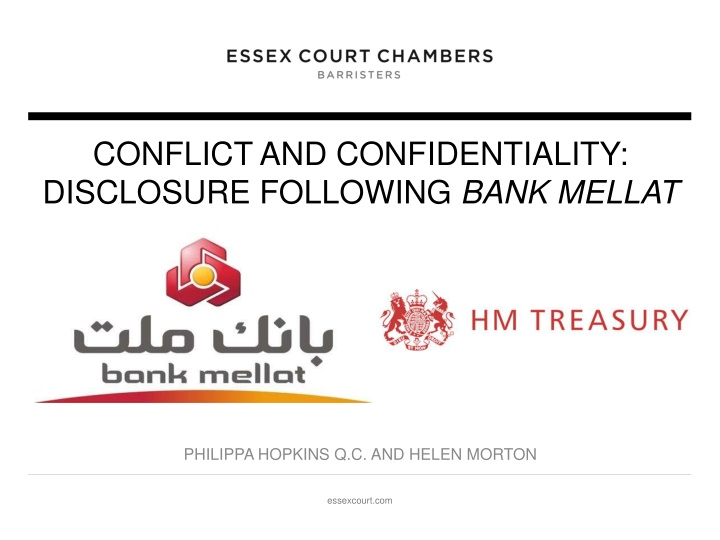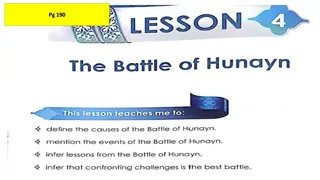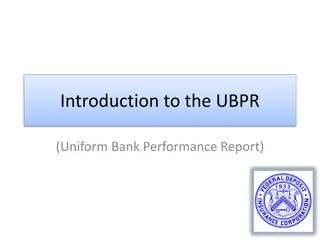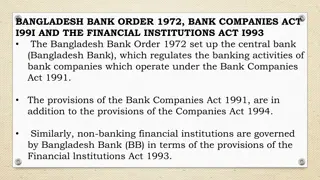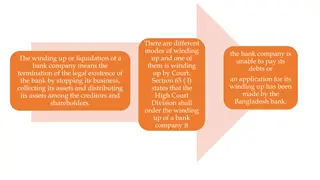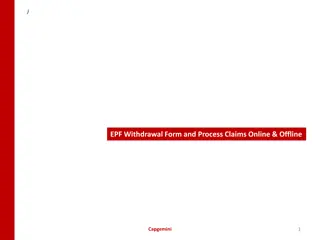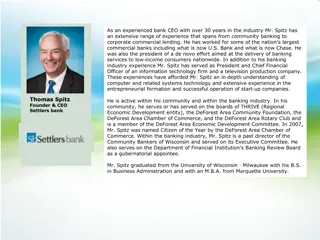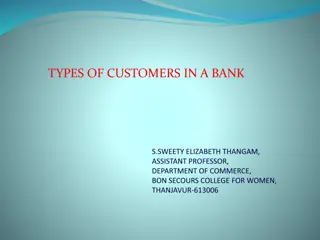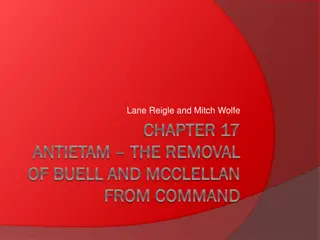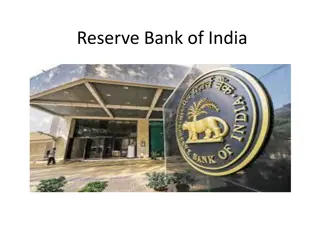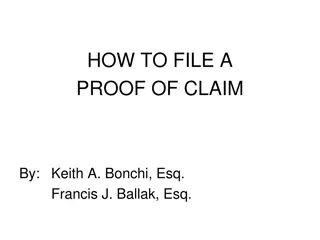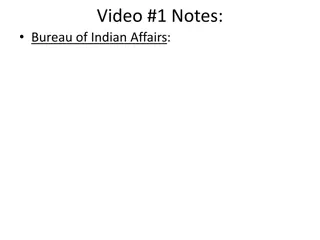Legal Battle Over Financial Restrictions: Bank Mellat's Claim History
The case involving Bank Mellat revolves around a financial restrictions order imposed in 2009, leading to a legal battle to recover damages under the Human Rights Act. The bank's original damages claim of $4.3 billion, later reduced to $1.7 billion, cites interference with its possessions due to various restrictive measures by different entities. The litigation journey includes actions in various UK courts concerning the disputed orders and the bank's quest for compensation.
Uploaded on Oct 02, 2024 | 1 Views
Download Presentation

Please find below an Image/Link to download the presentation.
The content on the website is provided AS IS for your information and personal use only. It may not be sold, licensed, or shared on other websites without obtaining consent from the author.If you encounter any issues during the download, it is possible that the publisher has removed the file from their server.
You are allowed to download the files provided on this website for personal or commercial use, subject to the condition that they are used lawfully. All files are the property of their respective owners.
The content on the website is provided AS IS for your information and personal use only. It may not be sold, licensed, or shared on other websites without obtaining consent from the author.
E N D
Presentation Transcript
CONFLICT AND CONFIDENTIALITY: DISCLOSURE FOLLOWING BANK MELLAT PHILIPPA HOPKINS Q.C. AND HELEN MORTON essexcourt.com essexcourt.com
BANK MELLAT: THE DISPUTE AND THE HISTORY Financial Restrictions Order (Iran) 2009 made by HMT under Schedule 7 to Counter-Terrorism Act 2008 Precluded any credit or financial institution from entering into or continuing to participate in any transaction or business relationship with designated persons Bank Mellat a designated person essexcourt.com
BANK MELLAT: THE DISPUTE AND THE HISTORY November 2009: action by Bank under section 63 of the CTA and CPR Part 79 to have the direction contained in the 2009 Order set aside and to recover damages under the Human Rights Act 1998 Bank lost before Mitting J [2010] Lloyd s Rep FC 504 and CA [2012] QB 101 But majority of UKSC allowed the Bank s claim [2014] AC 700 essexcourt.com
BANK MELLAT: THE DISPUTE AND THE HISTORY UKSC remitted the Bank s HRA 1998 claim to the Administrative Court Then transferred to the Commercial Court Preliminary issues determined by Flaux J in May 2015 (appeal to the CA judgment in 2016 [2016] EWCA Civ 452 In October 2018, proceedings were consolidated with Bank s challenge to two subsequent (2011 and 2012) financial restrictions orders Trial was fixed to be heard by Popplewell J over 5 weeks from 17 June 2019 essexcourt.com
BANK MELLAT: THE DISPUTE AND THE HISTORY essexcourt.com
BANK MELLAT: THE CLAIMS Bank s original damages claim was for $4.3 billion (later reduced to $1.7 billion) for interference with enjoyment of its possessions (HRA A1P1) caused by: The original 2009 Order; Other measures implemented by the EU and the UN against the Bank, which the Bank claimed were the result of the 2009 Order; Other measures in other jurisdictions, notably Dubai and South Korea; The 2011 and 2012 HMT Orders. essexcourt.com
BANK MELLAT: THE CLAIMS The Bank claimed that it had suffered loss as follows (after amendments to its SOC): FX letters of credit: loss of commission, loss of return on collateral, loss on associated FX transactions FX bank guarantees: loss of commission, loss of return on collateral Loss on putative discounted export LC business Seoul branch losses (mostly FX LCs) Loss on affected transactions LCs, BGs, penalty payments essexcourt.com
BANK MELLAT: THE CLAIMS Majority of claims: Bank asked Court to assess loss on a before and after or loss of market approach 2500 specific transactions said to have been directly affected by the 2009 Order and identified in an XL Schedule of Affected Transactions essexcourt.com
BANK MELLAT: THE ISSUES The issues which the Court would have had to decide included: What possessions of the Bank had been interfered with? Were they interfered with by the 2009 Order? What responsibility, if any, did HMT have for interference resulting from other measures, whether national or transnational? What was the quantum of loss? Was an award of damages necessary to give just satisfaction to the Bank? essexcourt.com
BANK MELLAT: DISCLOSURE GENERALLY Difficult case for disclosure generally: HMT s pleadings and disclosure were the subject of a Closed Material Procedure under CPR Part 79.25 Bank s disclosure spread across many sites in Iran; mainly hard copy 10% sample disclosure given on affected transactions Farsi translation difficulties Resourcing issues on both sides Trial was adjourned three times essexcourt.com
BANK MELLAT: THE REDACTIONS ISSUE Bank had indicated before disclosure that might be redactions Flaux J order, July 2016: In so far as the Claimant contends that it has a right or a duty to withhold inspection of any document, or any part of any document, it shall state that it has such right or duty in its supplemental disclosure statement and list and specify the grounds upon which it claims that right or duty. The Defendant has liberty to apply in the event that there is any dispute as to the Claimant s entitlement to withhold inspection. essexcourt.com
BANK MELLAT: THE REDACTIONS ISSUE disclosure, both transaction-specific documents and general Bank s documents (memoranda and similar) redacted customer names. Disclosure statement: The Bank asserts that it has a right or duty under Iranian Law and/or Korean Law and/or Turkish Law to redact information relating to their customers when giving inspection to HM Treasury. Such right or duty is being asserted based on the expert reports on Iranian, Korean and Turkish Law served with this disclosure statement. Basis of objection: customer names were confidential, and the production of unredacted documents, even in response to an order, would expose the Bank and its officials to the risk of prosecution in the countries concerned. essexcourt.com
BANK MELLAT: THE REDACTIONS ISSUE Hearing before Cockerill J in September 2018 Expert reports on Turkish and Korean law from both parties but only from Bank on Iranian law Cockerill J ordered that production of unredacted Iranian and Korean documents should be given Protection for the Bank: documents were to be ciphered, with a master list given only to a confidentiality club of named individuals The Bank appealed (in relation to Iran only) essexcourt.com
BANK MELLAT: THE REDACTIONS ISSUE The law before Bank Mellat: confidentiality (where it is asserted) is a relevant factor to be taken into account by the court in determining whether or not to order inspection. The court's task is to strike a just balance between the competing interests involved those of the party asserting an entitlement to inspect the documents and those of the party claiming confidentiality in the documents. In striking that balance in the exercise of its discretion, the court may properly have regard to the question of whether inspection of the documents is necessary for disposing fairly of the proceedings in question: see Science Research Council v Nass [1980] AC 1028 , especially pp 1065 1066 (Lord Wilberforce), p 1074 (Lord Edmund-Davies) and pp 1087 1088 (Lord Scarman) (National Crime Agency v. Abacha [2016] 1 W.L.R. 4375, per Gross LJ at 31). essexcourt.com
BANK MELLAT: THE REDACTIONS ISSUE Handful of cases dealing with the balance to be struck when production would be criminal under the relevant foreign law, but in very different circumstances: Morris v. Banque Arab et Internationale d Investissement SA [2000] CP Rep 65 Cadogan Petroleum plc v. Tolley [2009] EWHC 3291 (Ch) Secretary of State for Health v. Servier Laboratories Ltd [2014] 1 W.L.R. 4383 (on privilege against self-incrimination) Brannigan v Davison [1997] A.C. 238 essexcourt.com
BANK MELLAT: THE APPEAL The issues as the CA saw them were: The extent of the risk of prosecution if the Bank complied with the Judge s order; The importance of the unredacted documents to the fair disposal of the trial; and How to strike the right balance between those factors as a matter of discretion. essexcourt.com
BANK MELLAT: THE APPEAL The Bank agreed to provide ciphered documents but with no master list. It argued that: the Judge had misread the uncontradicted expert evidence, which demonstrated that there was a real risk of prosecution; unredacted documents were not critical to the resolution of the dispute; HMT s interests were sufficiently protected by receiving ciphered documents; the Bank should not be put in a position where it could only have its rights fairly determined by committing a crime in Iran; if the order was upheld, it would not comply with it. essexcourt.com
BANK MELLAT: THE APPEAL HMT argued: The Judge s decision was a case management decision with which the CA should not interfere; The expert evidence did not demonstrate a real risk of prosecution; The case could not be fairly decided without HMT knowing customer identities. essexcourt.com
BANK MELLAT: THE APPEAL The CA upheld the Judge s order [2019] EWCA Civ 449: It was found that the Judge had exercised her discretion correctly: She was entitled to conclude that their was insufficient evidence of a serious risk of prosecution under Iranian law; She was not bound by the expert evidence (the issue not being one of foreign law); She was entitled to conclude that the need for unredacted documents outweighed the risks of prosecution. essexcourt.com
BANK MELLAT: THE APPEAL At [63] (emphasis added): i) In respect of litigation in this jurisdiction, this Court (i.e., the English Court) has jurisdiction to order production and inspection of documents, regardless of the fact that compliance with the order would or might entail a breach of foreign criminal law in the "home" country of the party the subject of the order. ii) Orders for production and inspection are matters of procedural law, governed by the lex fori , here English law. Local rules apply; foreign law cannot be permitted to override this Court's ability to conduct proceedings here in accordance with English procedures and law. iii) Whether or not to make such an order is a matter for the discretion of this Court. An order will not lightly be made where compliance would entail a party to English litigation breaching its own (i.e., foreign) criminal law, not least with considerations of comity in mind (discussed in Dicey, Morris and Collins, op cit, at paras. 1-008 and following). This Court is not, however, in any sense precluded from doing so. essexcourt.com
BANK MELLAT: THE APPEAL iv) When exercising its discretion, this Court will take account of the real in the sense of the actual risk of prosecution in the foreign state. A balancing exercise must be conducted, on the one hand weighing the actual risk of prosecution in the foreign state and, on the other hand, the importance of the documents of which inspection is ordered to the fair disposal of the English proceedings. The existence of an actual risk of prosecution in the foreign state is not determinative of the balancing exercise but is a factor of which this Court would be very mindful. v) Should inspection be ordered, this Court can fashion the order to reduce or minimise the concerns under the foreign law, for example, by imposing confidentiality restrictions in respect of the documents inspected. vi) Where an order for inspection is made by this Court in such circumstances, considerations of comity may not unreasonably be expected to influence the foreign state in deciding whether or not to prosecute the foreign national for compliance with the order of this Court. Comity cuts both ways. essexcourt.com
BANK MELLAT: IMMEDIATE IMPACTS How does the decision affect a party seeking to withhold production of documents because of a risk of prosecution? Hardline decision Choose your expert carefully do you need more than one to cover (a) the law and (b) the actual risk of prosecution? Middle ways confidentiality clubs, ciphering Consider time and costs of protective measures Advise clients of consequence of non-compliance essexcourt.com
BANK MELLAT: IMMEDIATE IMPACTS How does the decision affect a party seeking to obtain inspection of documents? Don t be over-optimistic if the evidence had been different in Mellat, the result might have been too Consider carefully the reasons why production is really necessary Consider and engage with middle ways , taking on board time and cost considerations essexcourt.com
BANK MELLAT: WIDER IMPACTS Subsequent cases and comment: Thum v. Thum [2019] EWFC 25 Akhmedova v. Akhmedov [2019] EWHC 2561 (Fam) Rogerson: The place of comity in the disclosure of documents (C.L.J. 2019, 78(3), 483-486) essexcourt.com
BANK MELLAT: WIDER IMPACTS Confidentiality more generally: Is the wider position affected? General trends National Crime Agency v. Abacha [2016] 1 W.L.R. 4375, Dechert LLP v. Eurasian Natural Resources Corporation Ltd. [2016] EWCA Civ 375 Minera Las Bambas SA v. Glencore Queensland Ltd. [2018] EWHC 286 (Comm.) at [37] (Moulder J.): Confidentiality is a relevant factor, but it does not (on its own) justify a refusal to inspect... The question of whether inspection is necessary to dispose fairly of the proceedings is a relevant factor, but it is not a free-standing hurdle to be considered and surmounted in isolation before inspection may be permitted . essexcourt.com
BANK MELLAT: WIDER IMPACTS Banker/customer relationship issues: Duty of secrecy/confidentiality under English law Exceptions include legal compulsion (but court will need, again, to balance the competing considerations), public interest, protection by bank of its own interests, express or implied customer consent Is there an inconsistency between Bank Mellat and the likely approach in a domestic case? essexcourt.com
BANK MELLAT: WIDER IMPACTS What price comity? Anti-suit injunctions Worldwide freezing orders Illegality Foster v. Driscoll [1929] 1 K.B. 470; but see Ispahani v. Bank Melli [1998] 1 Lloyd s Rep. 133: international comity is naturally much readier to accept that a country s laws ought to be obeyed within its own territory, than to recognise them as having exorbitant effect. essexcourt.com
BANK MELLAT: WIDER IMPACTS Bank Mellat: Gross LJ at [90] Where an order for inspection is made by this Court in such circumstances, considerations of comity may not unreasonably be expected to influence the foreign state in deciding whether or not to prosecute the foreign national for compliance with the order of this Court. Comity cuts both ways. Transnational disclosure orders more generally: see Chitty on Contracts at [34-307] to [34-309] Recent cases do suggest a greater willingness both to entertain, and to grant, orders with extraterritorial effect: see e.g. Credit Suisse Trust v. Intesa San Paulo SPA [2014] EWHC 1447 (Ch) Does respect for comity mean what a particular Court wants it to mean? essexcourt.com
